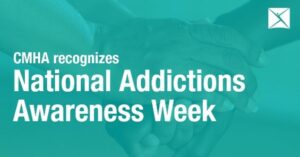With the increasing complexity of the addictions landscape, it is a collective effort to support those at risk. That’s the message of this year’s National Addictions Awareness Week (NAAW), an annual campaign led by the Canadian Centre on Substance Use and Addiction (CCSA). The campaign this year highlights the wide range of perspectives and evidence-informed approaches needed to address issues around substance use and addictions across the country.
Addictions can be either substance-related (such as the problematic use of alcohol or cannabis) or process-related, also known as behavioural addictions (such as gambling or internet addiction). Both can disrupt an individual’s ability to maintain a healthy life, but support and treatment options are available if you are at risk.
CMHA encourages Ontarians to take some time this week to reflect on their risk factors to addiction and access resources in their community. Here are some tips to get started:
1) Use person-first language which focuses on the individual, not on the addiction. By using non-stigmatizing language, those who are experiencing challenges may experience fewer barriers to accessing supports. CCSA has developed a tip sheet on overcoming stigma through language to help.
2) Get a free naloxone kit and learn how to use it. Naloxone is a fast-acting drug used to temporarily reverse the effects of opioid overdoses. Participating Ontario pharmacies offer free naloxone kits. You do not need a prescription or an Ontario health card to get a kit and the pharmacist will train you on how to recognize an opioid overdose and explain how to use it. Find a participating pharmacy in your neighbourhood here.
3) Review Canada’s Guidance on Alcohol and Health. If you’re drinking more than six standard drinks a week, you’re at an increasingly high risk for health issues. The good news is that any reduction helps lower the risks. Learn more here.
4) Read Knowing Your Limits with Cannabis: A Practical Guide to Assessing Your Cannabis Use. This CCSA resource helps individuals reflect on their cannabis use patterns while providing tips and strategies to encourage lower-risk behaviours to reduce harm.
5) Follow the lower-risk gambling guidelines. Given the increasing prevalence and access to gambling in the past year – particularly sports betting – it’s important to understand when this activity can turn from recreational to problematic, and to take steps to minimize potential harms. Check out CCSA’s lower-risk gambling guidelines and the risk assessment tool that individuals can use to see if they gamble within these guidelines.
6) Reach out if you need support. If you’re experiencing substance-related or process-related addiction and need support, reach out:
- The confidential, nonjudgmental overdose prevention hotline 1-888-688-NORS (6677) provides supports for people who use drugs. Learn more at the National Overdose Response Service website: nors.ca.
- ConnexOntario provides referrals for people experiencing problems with gambling, drugs, alcohol, or mental health. Available 24 hours a day, 7 days a week. Call 1-866-531-2600 or visit connexontario.ca for more information.
- Contact CMHA North Bay and District at 705-476-4088 for local services and supports in your community.
Spread the message about NAAW using the hashtags #InspirationInnovationInclusion and #NAAW2023 on your social media posts and show the different ways your community is supporting those in recovery.

